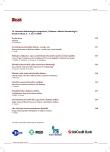Clinical Studies That Have Influenced the Treatment of Diabetes
Authors:
J. Olšovský
Authors‘ workplace:
Diabetologické centrum II. interní kliniky Lékařské fakulty MU a FN u sv. Anny Brno, přednosta prof. MUDr. Miroslav Souček, CSc.
Published in:
Vnitř Lék 2009; 55(4): 349-353
Category:
Overview
In the article, the author addresses the development of the targets of diabetes treatment. He provides an overview of the key clinical studies in diabetology from which we draw knowledge and therapeutical recommendations nowadays, i.e. in the times of evidence‑based medicine. The author emphasizes the need for comprehensive treatment of diabetes, i.e. the treatment of obesity, hypertension, dyslipidemia and also the impact on blood coagulation, however, focuses, in particular, on clinical studies focusing on the influence of diabetes compensation (the impact on hyperglycemia) on the development of vascular complications.
Key words:
diabetes mellitus – hyperglycemia – vascular complications – clinical studies
Sources
1. The DCCT Research Group. The effect of intensive treatment of diabetes on the development and progression of long‑term complications in insulin‑dependent diabetes mellitus. N Engl J Med 1993; 329 : 977–986.
2. DCCT/EDIC. Effect of intensive therapy on the microvascular complications of type 1 diabetes mellitus. JAMA 2002; 287 : 2563–2569.
3. Intensive blood-glucose control with sulphonylureas or insulin compared with conventional treatment and risk of complications in patients with type 2 diabetes (UKPDS 33). UK Prospective Diabetes Study (UKPDS) Group. Lancet 1998; 352 : 837–853.
4. Tight blood pressure control and risk of macrovascular and microvascular complications in type 2 diabetes: UKPDS 38. UK Prospective Diabetes Study Group. BMJ 1998; 317 : 703–713.
5. Efficacy of atenolol and captopril in reducing risk of macrovascular and microvascular complications in type 2 diabetes: UKPDS 39. UK Prospective Diabetes Study Group. BMJ 1998; 317 : 713–720.
6. Effect of intensive blood-glucose control with metformin on complications in overweight patients with type 2 diabetes (UKPDS 34). UK Prospective Diabetes Study (UKPDS) Group4. Lancet 1998; 352 : 854–865.
7. Charbonnell B, Dormandy J, Erdmann E et al. The prospective pioglitazone clinical trial in macrovascular events (PROactive): can pioglitazone reduce cardiovascular events in diabetes? Study design and baseline characteristics of 5 238 patients. Diabetes Care 2004; 27 : 1647–1653.
8. Dormandy JA, Charbonnel B, Eckland DJ et al. Secondary prevention of macrovascular events in patients with type 2 diabetes in the PROactive Study (PROspective pioglitAzone Clinical Trial In macroVascular Events): a randomised controlled trial. Lancet 2005; 366 : 1279–1289.
9. Kahn SE, Haffner SM, Heise MA et al. For the ADOPT Study Group. Glycemic Durability of Rosiglitazone, Metformin, or Glyburide Monotherap. N Eng J Med 2006; 355 : 2427–2443.
10. ACCORD, Gerstein HC, Miller ME et al. Effects of intensive glucose lowering in type 2 diabetes. N Engl J Med 2008; 358 : 2545–2559.
11. ADVANCE collaboration Group, Patel A, MacMahon S et al. Intensive blood glucose control and vascular outcomes in patients with type 2 diabetes. N Engl J Med 2008; 358 : 2560–2572.
12. Rationale and design of the ADVANCE study. J Hypertens 2001; 19 (Suppl 4): S21–S28.
13. ADVANCE collaboration Group ADVANCE-Action in Diabetes and Vascular Disease: patient recruitment and characteristics of the study population at baseline. Diabet Med 2005; 22 : 1–7.
Labels
Diabetology Endocrinology Internal medicineArticle was published in
Internal Medicine

2009 Issue 4
-
All articles in this issue
- Pharmacoeconomy of diabetes mellitus – trends in the Czech Republic
- Potential New Antidiabetics for the Next Decade
- Importance of the Structure of Insulin Preparations for Clinical Practice
- Functional Foodstuffs and Diabetes – Evidence and Myths
- Natural substances affecting type 2 diabetes
- New and Older Pharmaceuticals Influencing Insulin Secretion
- Insulin Sensitizing Drugs
- Costs of Type II Diabetes in the Conditions of the Czech Republic’s Medical Care System
- Drug Clinical Trials and Their Importance for Diabetology
- Clinical Studies That Have Influenced the Treatment of Diabetes
- Enteral and Parenteral Nutrition with Diabetes
- Hypolipidemic drugs and diabetes mellitus
- Target Values of Blood Pressure in Patients with Diabetes Mellitus
- Drugs Influencing Bone Metabolism in Diabetic Patients
- Hypothyroidism Substitution and Adrenal Insufficiency in Diabetic Patients
- Options of Hormonal Contraceptives and Substitution in Female Diabetic Patients
- Pharmaceutical Care of Patients with Diabetes Mellitus and Its Relationship to Clinical Pharmacy
- Improving Blood Pressure Control with Physician/Pharmacist Collaboration
- Drug Interactions of Selected Drugs Used by Patients with Diabetes Mellitus
- Drug‑drug interactions in diabetic patients at the department of clinical pharmacology
- Internal Medicine
- Journal archive
- Current issue
- Online only
- About the journal
Most read in this issue
- Target Values of Blood Pressure in Patients with Diabetes Mellitus
- Drug Interactions of Selected Drugs Used by Patients with Diabetes Mellitus
- Options of Hormonal Contraceptives and Substitution in Female Diabetic Patients
- Insulin Sensitizing Drugs
